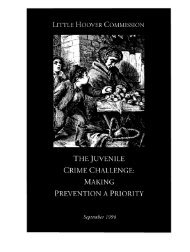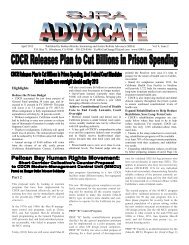Jailhouse Lawyer's Handbook - Sentencing and Justice Reform ...
Jailhouse Lawyer's Handbook - Sentencing and Justice Reform ...
Jailhouse Lawyer's Handbook - Sentencing and Justice Reform ...
You also want an ePaper? Increase the reach of your titles
YUMPU automatically turns print PDFs into web optimized ePapers that Google loves.
Chapter Five: How to Protect<br />
Your Freedom to Take Legal<br />
Action<br />
Just like people on the outside, prisoners have a<br />
fundamental constitutional right to use the court<br />
system. This right is based on the First, Fifth <strong>and</strong><br />
Fourteenth Amendments to the Constitution. Under the<br />
First Amendment, you have the right to “petition the<br />
government for a redress of grievances,” <strong>and</strong> under the<br />
Fifth <strong>and</strong> Fourteenth Amendments, you have a right to<br />
“due process of law.” Put together, these provisions<br />
mean that you must have the opportunity to go to court<br />
if you think your rights have been violated.<br />
Unfortunately, doing legal work in prison can be<br />
dangerous, as well as difficult, so it is important to<br />
KNOW YOUR RIGHTS!<br />
A terrible but common consequence of prisoner<br />
activism is harassment by prison officials. Officials<br />
have been known to block the preparation <strong>and</strong> filing of<br />
lawsuits, refuse to mail legal papers, take away legal<br />
research materials, <strong>and</strong> deny access to law books, all in<br />
an attempt to stop the public from knowing about<br />
prisoner issues <strong>and</strong> complaints. Officials in these<br />
situations are worried about any actions that threaten to<br />
change conditions within the prison walls or limit their<br />
power. In particular, officials may seek to punish those<br />
who have gained legal skills <strong>and</strong> try to help their fellow<br />
prisoners with legal matters. Prisoners with legal skills<br />
can be particularly threatening to prison management<br />
who would like to limit the education <strong>and</strong> political<br />
training of prisoners. Some jailhouse lawyers report<br />
that officials have taken away their possessions, put<br />
them in solitary confinement on false charges, denied<br />
them parole, or transferred them to other facilities<br />
where they were no longer able to communicate with<br />
the prisoners they had been helping.<br />
With this in mind, it is very important for those of you<br />
who are interested in both legal <strong>and</strong> political activism<br />
to keep in contact with people in the outside world.<br />
One way to do this is by making contact with people<br />
<strong>and</strong> organizations in the outside community who do<br />
prisoners’ rights or other civil rights work. You can<br />
also try to find <strong>and</strong> contact reporters who may be<br />
sensitive to, <strong>and</strong> interested in, prison issues. These can<br />
include print newspapers <strong>and</strong> newsletters, broadcast<br />
television <strong>and</strong> radio shows, <strong>and</strong> online sites. It is<br />
always possible that organizing from the outside aimed<br />
at the correct pressure points within prison management<br />
can have a dramatic effect on conditions for you on the<br />
inside.<br />
Certain court decisions that have established a st<strong>and</strong>ard<br />
for prisoner legal rights can be powerful weapons in<br />
your activism efforts. These decisions can act as strong<br />
evidence to persuade others that your complaints are<br />
legitimate <strong>and</strong> reasonable, <strong>and</strong> most of all, can win in a<br />
court of law. It is sometimes possible to use favorable<br />
court rulings to support your position in non-legal<br />
challenges, such as negotiations with prison officials or<br />
in administrative requests for protective orders, as well<br />
as providing a basis for a lawsuit when other methods<br />
may not achieve your desired goals.<br />
This Chapter explains your rights regarding access to<br />
the courts. This includes your right to:<br />
(1) File legal papers, <strong>and</strong> to communicate freely<br />
about legal matters with courts, lawyers, <strong>and</strong><br />
media;<br />
(2) Reasonable access to law books;<br />
(3) Obtain legal help from other prisoners or help<br />
other prisoners; <strong>and</strong><br />
(4) Be free from retaliation based on legal activity.<br />
A. THE RIGHT TO FILE PAPERS AND<br />
COMMUNICATE WITH COURTS, LAWYERS,<br />
LEGAL WORKERS, AND THE MEDIA<br />
In 1977, the Supreme Court held in a case called<br />
Bounds v. Smith, 430 U.S. 817 (1977), that prisoners<br />
have a fundamental constitutional right of access to the<br />
courts. This right of access requires prison authorities<br />
to help prisoners prepare <strong>and</strong> file meaningful legal<br />
papers in one of two ways. They can give you access<br />
to a decent law library OR they can hire people to help<br />
you with your cases. The prison gets to choose which<br />
way they want to do it. However, that ruling was<br />
changed by a later Supreme Court case, Lewis v. Casey,<br />
518 US. 343 (1996), which held that prisoners have to<br />
show an “actual injury” <strong>and</strong> the existence of a “nonfrivolous<br />
legal claim” to win an access to the courts<br />
case. In other words, even if your prison isn’t allowing<br />
you to use the law library <strong>and</strong> isn’t giving you legal<br />
help, you still can’t necessarily win a lawsuit about it.<br />
To win, you would also have to show that you have a<br />
real case that you lost or had problems with because of<br />
your lack of access to the law library or legal<br />
assistance. Courts do not agree on exactly what<br />
constitutes “actual injury” <strong>and</strong> it is not yet clear<br />
whether you need to show actual injury if prison<br />
officials have actively interfered with your right of<br />
access, like by stopping you from mailing a complaint.<br />
JAILHOUSE LAWYERS HANDBOOK – CHAPTER FIVE<br />
63





